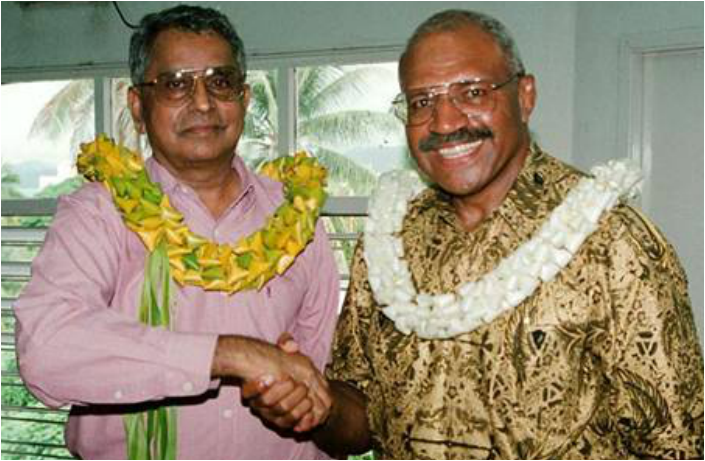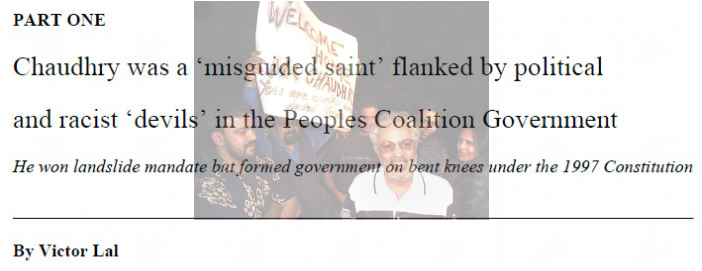A NOTE FROM HISTORY: In 1999 Ratu Naiqama Lalabalavu joined forces with Ratu Inoke Kubuabola and asked Rabuka to step down as leader of SVT after the party lost election to Peoples Coalition, led by Chaudhry. SHORTLY after Mahendra Chaudhry and his Cabinet Ministers were released from 56 days of captivity from the clutches of George Speight and his rebel group in 2000, VICTOR LAL wrote a six-part series in Fiji's then Daily Post newspaper arguing why Chaudhry was 'overthrown' and also looked at Sitiveni Rabuka's forced departure as SVT leader. Below, we reproduce excerpts for our readers and the general Fijian public
"...While [Mahendra] Chaudhry seemed to have won the first round of the battle, Rabuka resigned from his embattled leadership of the SVT, and went on to become the chairman of the Great Council of Chiefs. Chaudhry allocated Adi Kuini the powerful but sensitive Fijian Affairs portfolio which made her chairperson of the Great Council of Chiefs, from where she was expelled by the Rabuka Government because of her leadership of the FAP. From hindsight, it was a strategic mistake, for now Adi Kuini suddenly found herself having to deal with Rabuka as the leader of the powerful body when she and her party expected a senior Fijian chief to fill the revered role. Moreover, Rabuka had wanted her Fijian Affairs post as part of the condition to enter Chaudhry’s government.
As he exited from the political scene, Rabuka again blamed the Indo-Fijians for rejecting his party’s philosophy of multi-racialism. There was no call to the indigenous Fijians to shed their own insular and inward looking nationalism, and to reciprocate by accepting the Peoples Coalition’s version of multi-racialism. We have already pointed out elsewhere why the charges against the Indo-Fijians are false. What had caused SVT’s defeat, according to Rabuka, was ‘the personal weaknesses of the candidates, the personal weaknesses of those that were sitting in the last [Rabuka] government, failing to visit their Constituency regularly, the unpopularity of some of the Government policies, the weaknesses in our party machinery and structure’, and of course, ‘my coalition with the National Federation Party (NFP) was one of the causes of the SVT downfall’. It was not THE cause of SVT’s downfall.
The Mara family and STV’s downfall?
What role did the Mara family play in the SVT and Rabuka’s downfall was another topic of speculation, for the family was very closely aligned to the VLP? Rabuka himself raised the issue with Mara, who told him ‘my conscience is clear’.
Rabuka recounts to The Review: ‘I don’t know whether that is true…whether they [the Mara family] were instrumental in the formation of that party [VLP] or whether they supported it for…can’t be ideological reasons because ideologically they were not different from the SVT. In fact, when I handed in my resignation, I asked the President whether he was involved. I asked him whether he was actively involved in the VLP. All he said to me was ‘my conscience is clear’ which is very non-committal. I asked him whether he was actively involved in the VLP and I related to him the Saul/David situation in the Bible where Saul was anointed King. While he was still reigning as king, Samuel the prophet anointed David to be his successor. Then David went and killed Goliath and was brought into the palace and lived with Saul as an entertainer. On three occasions Saul tried to kill David and David’s followers said ‘kill him’. He had so many opportunities to kill Saul but David said ‘The Lord forbid that I should lift up my hand against the Lord’s anointed’. I related that to the President and said: ‘Sir, even if you are, I believe that you were called to that position and I was called to this position and I will not lift my hand or raise my hand against you because I believe that you were anointed. All he said to me was ‘my conscience is clear’.’
Before the 1992 general election, Rabuka stood for the presidency of the SVT, beating Mara’s wife, Adi Lady Lala Mara to the post. Was that where things went from bad to worse in his relationship with the Maras. Rabuka replied as follows: ‘It shouldn’t have been because my selection was done the proper way. Hers was only thought of at the meeting. Yes! My candidacy was lobbied for by Cakaudrove. We went to Bua and Macuata and asked Lau for support and some other provinces. At the meeting, someone realised what was going to happen (that Rabuka was going to win) and Tomasi Vakatora stood up and nominated Adi Lala.’
Rabuka on Rabuka
In the same interview, he gave an insight into his own departure from the leadership of the SVT: ‘Two members of Parliament from Cakaudrove - Kubuabola and Ratu Naiqama Lalabalavu - asked me to step down as Leader of the Opposition and party leader. I told them if they had the support of other members of the SVT, the UGP and the Independent members, I would step down. They said they would talk to them. Five minutes later David Pickering called me and asked me if I had agreed to step down. I asked why and he said Ratu Inoke asked him in the morning-we had met at 12 o’clock-whether he would support him for the leadership. This is despite Ratu Inoke saying to me that he would seek support after talking to me. That is a very devious way of doing it. I don’t mind now that I know, but I just want them to be very clear about what they’re doing because if their plot backfires on them, they can only blame themselves.’
When asked whether it was a wise move by the SVT to ask him to step down, Rabuka replied as follows: ‘At that time racial feelings within SVT were very strong. People thought that my conciliatory stance and my leadership of a racially-based party in an inter-racial search for harmonious coexistence in Fiji was incongruous. They felt that a more nationalistic leader should be asked to take over the reigns. I don’t know how those people who came up with that idea are feeling now…whether Kubuabola or Ratu Epeli Mataini who are now Leader of the Opposition and SVT president respectively are doing what those people wanted.’
Rabuka then ventured to comment on other Fijians, notably people like Ratu Tu’uakitau Cokanauto, who was harbouring leadership ambitions and saying Fijians should be invited.
Rabuka told The Review: ‘I think the very simple-minded will probably believe him. The serious thinkers won’t. They will see through that very thin veil. Fijians lost the government because they were not united. We had the first when the Fijian Association (FAP) ceded from the SVT in 1993. Now members of the FAP, particularly those who were behind that split are calling for unity. You see the hypocrisy of these people like Cokanauto and other people now calling for unity. They were the ones who started the break.’
The Mara/Cakobau Dynasty
In recent years there has been a public split between the Mara/Cakobau political and traditional dynasty. The victory of the Fiji Labour Party, the inclusion of Ratu Mara’s daughter as a Minister in Chaudhry’s government, and Ratu Mara’s elevation as President of Fiji, drove a further wedge between the Mara-Cakobau clan in Fijian politics. It was not surprising, therefore, that Speight and others hailing from the Cakobau side of the traditional clan had been baying for Mara’s political blood shortly after seizing power. Unlike the Mara family, the Cakobau family had been badly defeated at the polls.
As the Daily Post pointed out on 19 May 1999, a year to the day Speight and his hoodlums seized the Chaudhry government, the Cakobau family name was not enough to muster the support of Tailevu voters as brother, sister, and cousin lost their respective seats. Members of this chiefly Bau and Tailevu family, regarded highly throughout the country, could not hold on to their voting leads, and lost out after preferences were distributed. Ratu Epenisa Cakobau, Adi Litia Cakobau’s brother, lost the Tailevu South Lomaiviti open seat to political enthusiast and Fiji Labour Party candidate Isireli Vuivau. Ratu Epenisa was among those who had formed the Fijian Association Party. However, he withdrew his support from the party after his elder sister Adi Samanunu contested the 1994 elections for the SVT. ‘Family unity is very important to me’, he had said then.
The first to concede defeat was Adi Litia Cakobau, the daughter of the late Vunivalu. She had contested the Tailevu North/Ovalau open seat, a seat which my late father, as President of the Tailevu North Alliance District Council, had actively campaigned and helped Ratu George Cakobau to win in the 1970s. Adi Litia and Ratu Epenisa had contested the elections under the SVT electoral tickets. An emotional Adi Litia attributed their loss to what she described as the other Fijian parties determination to eliminate the SVT. ‘It is really sad that the other parties had preached that we had sold out the interest of Fijians. People, the Fijians, need to understand their Constitution. The rights of the indigenous is well protected. The question they should ask is what will happen now-will they be able to get extra or special protection as given to them by the SVT.’
She noted that her loss was as a result of ‘a divided Fijian front’. Adi Litia said that the ‘vanua no longer could dictate the people’s political preference but that is democracy’. ‘The people have chosen their representatives and that is what counts’, Adi Litia said. She had also moved Sitiveni Rabuka’s name for chairman of the Great Council of Chiefs, while Ratu Tevita Vakalalabure of Cakaudrove moved her name for vice chairman. This clearly showed that the provinces of Tailevu and Cakaudrove wanted to control the Council, especially after the SVT lost power in the general elections to the Peoples Coalition of Labour, Fijian Association and PANU.
History is also repeating itself. Professor Ravuvu is asking us to wait for the birth of a new Constitution. If a Constitution emerges from such a chaotic and inexpert approach, we will have a Constitution with all the attendant problems of the ‘Bau Constitution’ of the 19th Century.
In the next instalment, we will demonstrate that the current crisis in the Fijian community has its roots in the past. And unless the constitutional framers come to grips with Fijians 19th Century past, they would not be able to chart the Fijians’ 21st Century future."



